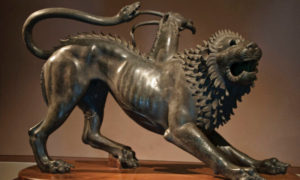Biennale (bee-uh-NAA-lay) is Italian for “every other year.” The Venice Biennale, for example – the original on which other large-scale international contemporary art exhibitions have been modeled – is held every two years.
A paean (PEE-un) is a joyous song or hymn of praise, thanksgiving, or triumph. It originated in Ancient Greece as a tribute to Apollo in his guise as Paean, physician to the gods, for his help in healing warriors wounded in battle. As I used it today in my book review: “According to a review in The Guardian, Drive Your Plow is much more than a murder mystery. It’s a primer on the politics of vegetarianism, a dark feminist comedy, an existentialist fable, and a paean to William Blake.”
A philomath (FIL-oh-math) – from the Ancient Greek – is a scholar, a lover of learning. As used by Sydney George Fisher in The True Benjamin Franklin: “There was a rival [to ‘Poor Richard’s Almanack’] of which the philomath was Titan Leeds.”
Social science, according to Merriam-Webster, is “a branch of science that deals with the institutions and functioning of human society and with the interpersonal relationships of individuals as members of society.”
Or, according to Michael Kinsley, social science is an oxymoron: “Science means hypotheses you can test, and prove or disprove. Social science is little more than observation putting on airs.”
Piaculative (pie-AK-yuh-luh-tiv) was coined by T.S. Eliot for his poem “Mr. Eliot’s Sunday Morning Service.” Derived from the Latin for “appease, purify, expiate,” it refers to atonement or reparation – e.g., for a sin or crime.
From the poem:
The sable presbyters approach
The avenue of penitence;
The young are red and pustular
Clutching piaculative pence.
Amortization – from the Latin for “to kill” – is the process of gradually paying off a loan by making planned, incremental payments. With real estate, this is done with a mortgage. As each payment is made, part of it is applied as interest on the loan and the remainder goes toward reducing the principal.
Negative Amortization refers to an increase in the principal balance of a loan caused by a failure to cover the interest due on that loan. For example, if the interest payment on a loan is $500 and the borrower only pays $400, the $100 difference would be added to the loan’s principal balance.
Petrichor (PEH-truh-kor) is a pleasant smell that accompanies the first rain after a long period of warm, dry weather. The word was coined by two scientists who needed a name for the phenomenon to use in an article they were writing about their research in the journal Nature. They derived it from petra (Greek for “stone”) and ichor (a fluid said to flow like blood through the veins of the Greek gods).
Bioregionalism is an environmentalist movement based on the belief that political, cultural, and economic systems are more sustainable and just if they are organized by naturally defined boundaries (e.g., mountain ranges and rivers) instead of the artificially drawn boundaries that divide states and countries. According to Judith Plant, a leader of the movement: “Simply put, it means learning to become native to a place, fitting ourselves to a particular place, not fitting a place to our pre-determined tastes. It is living within the limits and the gifts provided by a place, creating a way of life that can be passed on to future generations.”
Brazilian Jiu Jitsu is a martial art and combat sport based on ground fighting and submission holds. It focuses on the skill of taking your opponent to the ground, controlling him, gaining a dominant position, and using a number of techniques to force him into submission via joint locks or chokeholds.
Chimerical (kye-MEER-uh-kl) – from the Ancient Greek for “she-goat” – means fantastic; wildly fanciful. In Greek mythology, the chimera (kye-MEER-uh) was a three-headed, fire-breathing monster. It had the body and head of a lion, a goat’s head rising from its back, and a serpent or dragon for a tail.

As used by Arthur Conan Doyle in A Study in Scarlet: “Yes; I have a turn both for observation and for deduction. The theories which I have expressed here, and which appear to you to be so chimerical, are really extremely practical – so practical that I depend on them for my bread and cheese.”
